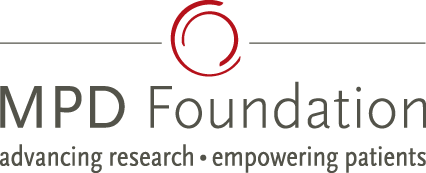By Ann Brazeau
The MPD Foundation believes that an educated patient is an empowered patient who can share what they know with their health care professionals to optimize treatment protocols and be able to fully participate in important decisions for their future care. To that end, in May 2010, the MPD Foundation hosted a patient education symposium in San Mateo, CA. Guest speakers included Drs. Ayalew Tefferi and Ruben Mesa from the Mayo Clinic, Dr. Jason Gotlib from Stanford, Dr. Ann Mullally from Harvard, Dr. David Leibowitz from the Palo Alto Cancer Center and author Joy Selak. For those who couldn't make it, a video of the event is available here.
Patients, family members and physicians are encouraged to attend these programs where they will hear from leading experts in the field of myeloproliferative disorders / neoplasms. Research updates, information on current clinical trials and day to day maintenance of these rare blood cancers are discussed. Open forums are provided for questions and one on one opportunities to speak with the researchers and clinicians. Attendees enjoy meeting other patients in a safe and warm environment.
This fall, the MPD Foundation will host a symposium in San Diego, California. Dr. Catriona Jamieson will be our keynote speaker and will be joined by other leading MPD researchers and clinicians. Dr. Jamieson, MD, PhD, is Assistant Professor of Medicine/Division of Hematology-Oncology and Director for Stem Cell Research at Moores Universtiy of California San Diego Cancer Center. Dr. Jamieson studies the mutant stem cells and progenitor cells in myeloproliferative disorders / neoplasms. Her studies have run the gamut from identifying a promising treatment in the laboratory, to opening and completing the first clinical trial, to target cancer stem cells in humans. Please continue to check our Events page for updates on the next MPD symposium.
www.mpdfoundation.org
